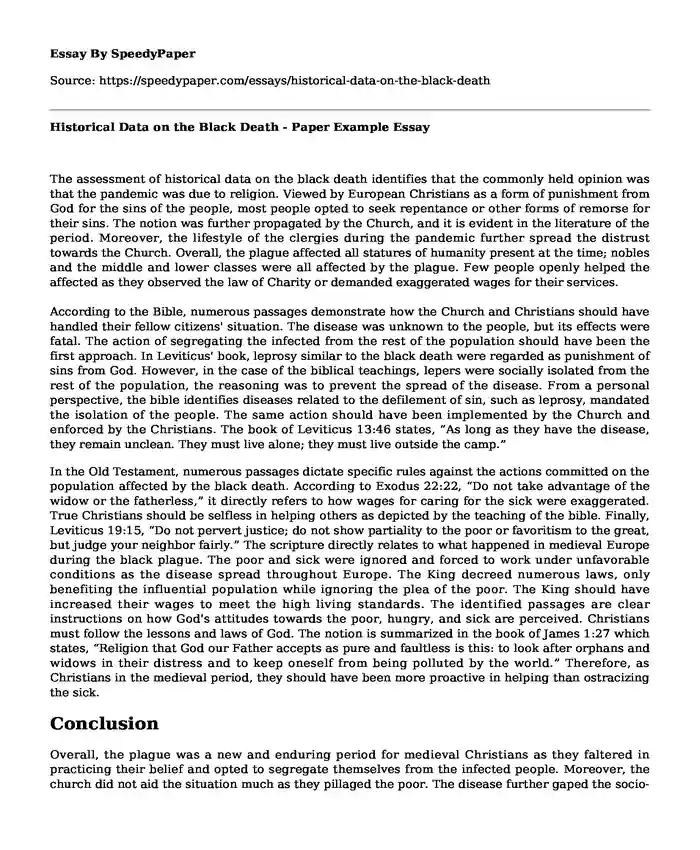
| Essay type: | Argumentative essays |
| Categories: | Population Christianity Church Community health |
| Pages: | 3 |
| Wordcount: | 757 words |
The assessment of historical data on the black death identifies that the commonly held opinion was that the pandemic was due to religion. Viewed by European Christians as a form of punishment from God for the sins of the people, most people opted to seek repentance or other forms of remorse for their sins. The notion was further propagated by the Church, and it is evident in the literature of the period. Moreover, the lifestyle of the clergies during the pandemic further spread the distrust towards the Church. Overall, the plague affected all statures of humanity present at the time; nobles and the middle and lower classes were all affected by the plague. Few people openly helped the affected as they observed the law of Charity or demanded exaggerated wages for their services.
According to the Bible, numerous passages demonstrate how the Church and Christians should have handled their fellow citizens' situation. The disease was unknown to the people, but its effects were fatal. The action of segregating the infected from the rest of the population should have been the first approach. In Leviticus' book, leprosy similar to the black death were regarded as punishment of sins from God. However, in the case of the biblical teachings, lepers were socially isolated from the rest of the population, the reasoning was to prevent the spread of the disease. From a personal perspective, the bible identifies diseases related to the defilement of sin, such as leprosy, mandated the isolation of the people. The same action should have been implemented by the Church and enforced by the Christians. The book of Leviticus 13:46 states, “As long as they have the disease, they remain unclean. They must live alone; they must live outside the camp.”
In the Old Testament, numerous passages dictate specific rules against the actions committed on the population affected by the black death. According to Exodus 22:22, “Do not take advantage of the widow or the fatherless,” it directly refers to how wages for caring for the sick were exaggerated. True Christians should be selfless in helping others as depicted by the teaching of the bible. Finally, Leviticus 19:15, “Do not pervert justice; do not show partiality to the poor or favoritism to the great, but judge your neighbor fairly.” The scripture directly relates to what happened in medieval Europe during the black plague. The poor and sick were ignored and forced to work under unfavorable conditions as the disease spread throughout Europe. The King decreed numerous laws, only benefiting the influential population while ignoring the plea of the poor. The King should have increased their wages to meet the high living standards. The identified passages are clear instructions on how God's attitudes towards the poor, hungry, and sick are perceived. Christians must follow the lessons and laws of God. The notion is summarized in the book of James 1:27 which states, “Religion that God our Father accepts as pure and faultless is this: to look after orphans and widows in their distress and to keep oneself from being polluted by the world.” Therefore, as Christians in the medieval period, they should have been more proactive in helping than ostracizing the sick.
Conclusion
Overall, the plague was a new and enduring period for medieval Christians as they faltered in practicing their belief and opted to segregate themselves from the infected people. Moreover, the church did not aid the situation much as they pillaged the poor. The disease further gaped the socio-economic classes as the poor people were mainly affected by the disease. People stopped trading and farming in fear of the disease, thereby directly and indirectly affecting all classes of people. The disease commonly viewed as a form of punishment by God drove people away from each other in fear. The disease is speculated to have originated from Asia and arrived in Europe through trade merchants. However, the effects of the disease left lasting effects that altered medieval Europe.
Bibliography
"Giovanni Boccaccio: On Black Death Victims In Florence (Ca. 1349-1351)". In Daily Life Through History. ABC-CLIO, last modified 2020. https://dailylife2-abc-clio-com.ezzproxy.liberty.edu.
Byrne, Jospeh P. "Black Death: Overview". In Daily Life Through History. ABC-CLIO, last ast modified 2020. http://dailylife2.abc-clio.ezproxy.liberty.edu/Topics/Display/1681929?cid=41.
Byrne, Jospeh P. "Entertainment During The Black Death". In Daily Life Through History. ABC-CLIO, last ast modified 2020. http://dailylife2.abc-clio.ezproxy.liberty.edu/Topics/Display/1681929?cid=103.
Byrne, Jospeh P. "Language & Literatureduring the Black Deeath: Language and Literature.". In Daily Life Through History. ABC-CLIO, last ast modified 2020. http://dailylife2.abc-clio.ezproxy.liberty.edu/Topics/Display/1681929?cid=98.
Byrne, Jospeh P. "Working during the Black Death: Work". In Daily Life Through History. ABC-CLIO, last ast modified 2020. http://dailylife2.abc-clio.ezproxy.liberty.edu/Topics/Display/1681929?cid=97.
Cite this page
Historical Data on the Black Death - Paper Example. (2023, Sep 14). Retrieved from https://speedypaper.com/essays/historical-data-on-the-black-death
Request Removal
If you are the original author of this essay and no longer wish to have it published on the SpeedyPaper website, please click below to request its removal:
- Persuasive Research Paper Example on Racial Profiling
- An Essay Sample on Intelligence Information Report
- Essay Sample on Planned Parenthood Funding
- Essay Sample on The Medicare Sustainable Growth Rate
- Analysis of Case Study on Cataracts. Essay Example
- 5-Year Professional Plan: Healthcare Goals for Career Growth - Essay Sample
- Free Essay - History of Current and Past Psychological Functioning
Popular categories




